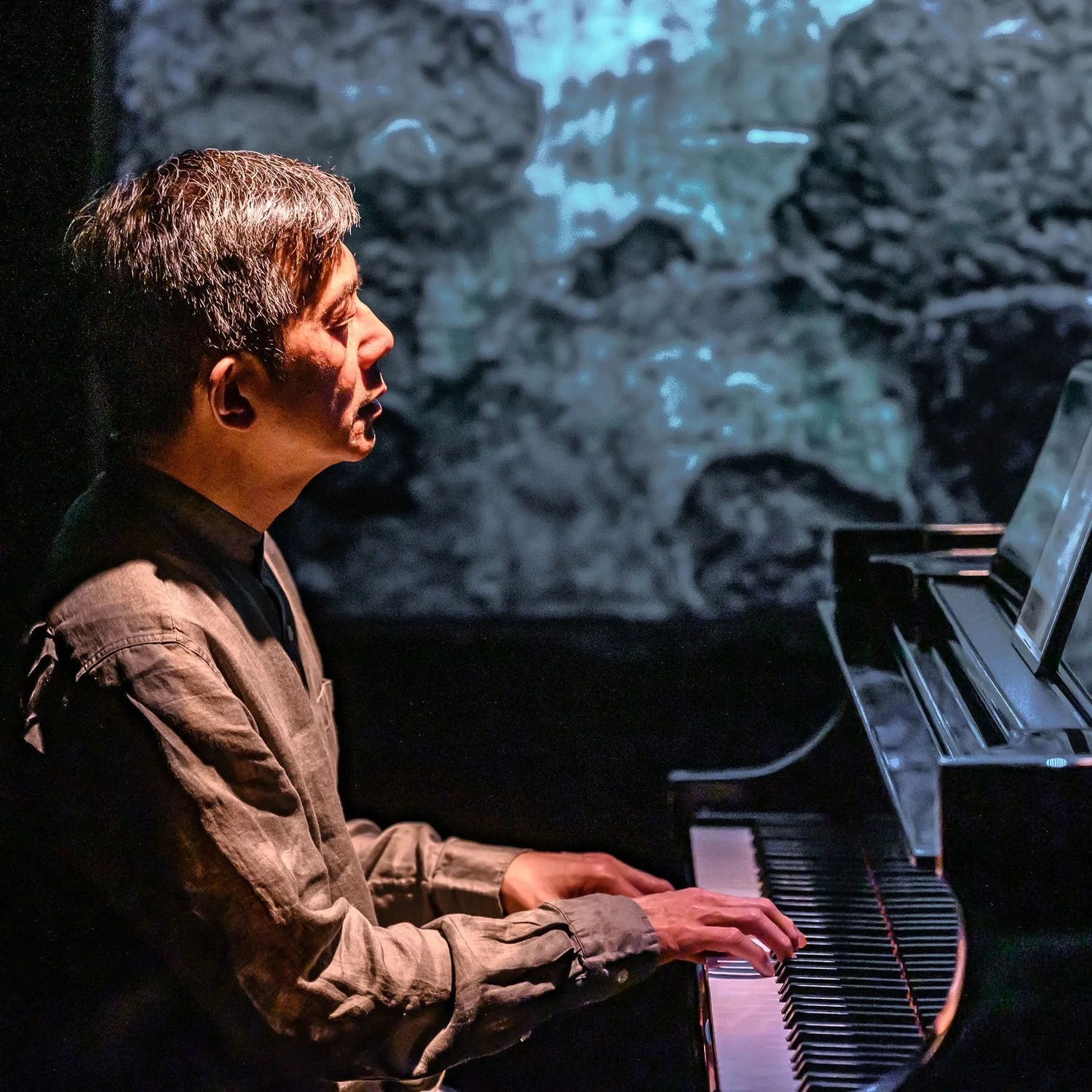I swallowed a moon made of iron pays tribute to haunting poetry borne out of Chinese factory despair
Njo Kong Kie’s solo ode to the late Xu Lizhi mixes music, movement, and projections
Njo Kong Kie reinterprets the humanity of Xu Lizhi’s poetry through piano, projections, and song. Photo by Dahlia Katz
PuSh International Performing Arts Festival presents I swallowed a moon made of iron at the Waterfront Theatre from February 4 to 6, and online on February 6 and 7
NJO KONG KIE appreciates that his working conditions are positively cushy next to those Xu Lizhi endured.
While Njo gets to sit at a piano in his Toronto home, writing dance scores and art songs, Xu laboured in a haze of toxic chemicals, making cellphones and other consumer electronics for the Foxconn Technology Group. Njo has all the privacy he needs; Xu was always elbow-to-elbow with thousands of other workers, all of them whipped by the clock and goaded to achieve maximum productivity. Njo gets to collaborate with international luminaries such as La La La Human Steps choreographer Édouard Lock; Xu took his own life in 2014, broken at 24 by the unrelenting demands of the assembly line.
Before he died, however, Xu left behind a body of unflinchingly acute poems, most documenting his own brief life, and as soon as Njo read them he was floored by their eloquent humanity.
“There was an immediate recognition in my heart, I suppose, of the emotional experience he was going through,” the composer and pianist explains in a telephone conversation from his home. “Even though I’ve never worked a day in a factory, and certainly not on a scale like that.”
That shock and recognition, he continues, spurred the creation of his one-man show I swallowed a moon made of iron, named for Xu’s best-known poem. Njo’s solo performance combines music, singing, movement, and projected visuals into an anguished but beautiful exploration of the late poet’s life—and by extension, the lives of all of us now witness to the horrors of late-stage capitalism.
Horrors, Njo agrees, that have been brought into sharp scrutiny by the COVID pandemic, which has exposed the precarity of all labour, industrialized or not.
“That’s certainly true,” he says. “I’ve observed the same thing as well, and I think in some ways it makes Xu’s experience closer to home. Even if we haven’t had to experience the kind of physical endurance that workers like him have to go through, we all know that kind of despair in terms of feeling like there’s no way out, or not knowing what the next day is supposed to be for.”
Njo laughs, aware that he’s skirting perilously close to the cliché of the tortured artist, wringing his hands over existential conundrums. But we’ve all experienced those, haven’t we?
Even Xu wasn’t alone in his feelings. Despite the loneliness of his life, he was part of a network of worker-poets who often wrote in opposition to China’s industrial economy, sharing their work on Instagram, far from official literary circles. “People took to writing as a way to document their thoughts, and in some ways just to escape their day-to-day reality,” Njo explains. “And Xu’s poetry is very straightforward, but what for me is impactful is the stories that he tells, the associations that he’s able to bring up. They’re in some ways very mundane, but then juxtaposing the day-to-day with other more poetic imagery. It’s very direct. The message is very clear; there’s not much ambiguity in terms of what he’s getting at.”
Finding a form that would honour this clarity and intimacy took some time. Although I swallowed a moon made of iron has gained impact from the pandemic, Njo first encountered Xu’s writing shortly after the poet’s suicide, and has been working on this piece almost as long. At first, he envisioned a relatively conventional song cycle, with a trained singer accompanied by his own piano. He soon realized, though, that taking the spotlight himself would best complement the raw emotion of the texts.
“In some ways it’s honouring his culture,” Njo says, adding that he’s not a trained singer, apart from having performed in the occasional choir. “He had very little education in terms of being a poet, which was very representative of the people who write poetry in that style. But you use what you have, and you make something—and in my mind it seems fitting that I would do it this way.
“I was pushing myself to respond to the poetry as fully as I can,” he continues. “Xu lived pretty much in his own head, so I decided that I would perform it on the piano and vocally, and then the next layer was the movement aspect of it. And obviously, as a musician, movement is part of our domain as well. When we play, we have a particular way of expressing the music through our bodies—and so we just expanded that to ‘What happens if I’m away from the keyboard?’ So I worked with a movement coach for a while: I would improvise, and he helped me put together a movement sequence.”
The result, Njo admits, is “not a happy show”. But it’s raw, inventive, and offers a poignant window into the everyday industrial brutality that makes our North American comforts possible.
“It solicits emotions, I think, from the audience,” Njo says. “It’s an occasion to appreciate the artistry of the poems themselves; to be taken by the beauty of the words and the imagery they conjure—but at the same time to ponder about Xu’s experience and how that relates to us all.”













